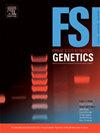验证 IDseek® OmniSTR™ 全球常染色体 STR 分析试剂盒,将反向互补 PCR 作为常规大规模并行测序短串联重复序列的改进工具/方法。
IF 3.2
2区 医学
Q2 GENETICS & HEREDITY
引用次数: 0
摘要
过去十年来,大规模平行测序(MPS)在法医界越来越受到关注。大多数已发表的 MPS 方法都侧重于专业应用,旨在用于数量有限的样本,其方案相对费力。利用反向互补 PCR 技术的最新发展,使高效的 MPS 方案适用于大量样本的常规分析。IDseek® OmniSTR™ 全球常染色体 STR 分析试剂盒(Nimagen)采用了这种方法,对 28 种最常用的法医常染色体 STR、一种 Y 染色体 STR 和 Amelogenin 进行测序。本研究介绍了该试剂盒的验证情况,重点是灵敏度、抑制剂耐受性、序列变异检测和多达 5 个贡献者混合物的性能。研究结果与毛细管电泳方法(Promega 公司的 PowerPlex® Fusion 6 C 系统)和首个商用法医 MPS 试剂盒(Qiagen 公司的 ForenSeq™ DNA Signature 预处理)进行了比较,并与 Powerseq® MPS 试剂盒的数据进行了一致性研究。对 FDSTools 中的分析设置进行了推导和讨论,并实现了几乎完全自动化的分析。利用 FDSTools 的噪声校正功能,可以检测到混合物中低至 1.5 % 的标记物主要等位基因的贡献。本文章由计算机程序翻译,如有差异,请以英文原文为准。
Validation of the IDseek® OmniSTR™ Global Autosomal STR Profiling kit, reverse complement PCR as an improved tool/method for routine massively parallel sequencing of short tandem repeats
Massively Parallel Sequencing (MPS) has gained interest in the forensic community over the past decade. Most of the published MPS methods focus on specialty applications intended for use in a limited number of samples with protocols that are relatively laborious. Recent developments using Reverse-Complement PCR enable an efficient MPS protocol suited for routine analysis of high numbers of samples. This method is implemented in the IDseek® OmniSTR™ Global Autosomal STR Profiling kit (Nimagen) for sequencing 28 of the most commonly used forensic autosomal STRs, one Y-chromosomal STR and Amelogenin. This study describes the validation of this kit and focuses on sensitivity, inhibitor tolerance, sequence variation detection and performance with mixtures up to 5 contributors. Results are compared to a Capillary Electrophoresis method (the PowerPlex® Fusion 6 C system, Promega) and the first commercial forensic MPS kit (ForenSeq™ DNA Signature prep, Qiagen) and for a concordance study with data from the Powerseq® MPS kit as well. Analysis settings in FDSTools are deduced and discussed, and an almost completely automated analysis is achieved. Using FDSTools noise correction, contributions in a mixture down to a level of 1.5 % of the major allele of a marker can be detected.
求助全文
通过发布文献求助,成功后即可免费获取论文全文。
去求助
来源期刊
CiteScore
7.50
自引率
32.30%
发文量
132
审稿时长
11.3 weeks
期刊介绍:
Forensic Science International: Genetics is the premier journal in the field of Forensic Genetics. This branch of Forensic Science can be defined as the application of genetics to human and non-human material (in the sense of a science with the purpose of studying inherited characteristics for the analysis of inter- and intra-specific variations in populations) for the resolution of legal conflicts.
The scope of the journal includes:
Forensic applications of human polymorphism.
Testing of paternity and other family relationships, immigration cases, typing of biological stains and tissues from criminal casework, identification of human remains by DNA testing methodologies.
Description of human polymorphisms of forensic interest, with special interest in DNA polymorphisms.
Autosomal DNA polymorphisms, mini- and microsatellites (or short tandem repeats, STRs), single nucleotide polymorphisms (SNPs), X and Y chromosome polymorphisms, mtDNA polymorphisms, and any other type of DNA variation with potential forensic applications.
Non-human DNA polymorphisms for crime scene investigation.
Population genetics of human polymorphisms of forensic interest.
Population data, especially from DNA polymorphisms of interest for the solution of forensic problems.
DNA typing methodologies and strategies.
Biostatistical methods in forensic genetics.
Evaluation of DNA evidence in forensic problems (such as paternity or immigration cases, criminal casework, identification), classical and new statistical approaches.
Standards in forensic genetics.
Recommendations of regulatory bodies concerning methods, markers, interpretation or strategies or proposals for procedural or technical standards.
Quality control.
Quality control and quality assurance strategies, proficiency testing for DNA typing methodologies.
Criminal DNA databases.
Technical, legal and statistical issues.
General ethical and legal issues related to forensic genetics.

 求助内容:
求助内容: 应助结果提醒方式:
应助结果提醒方式:


